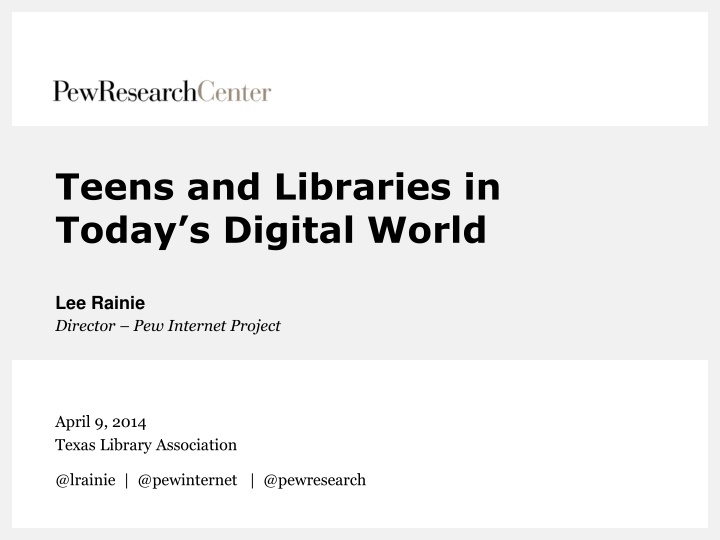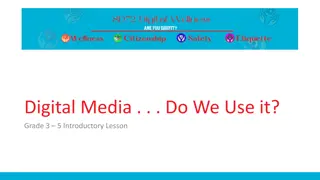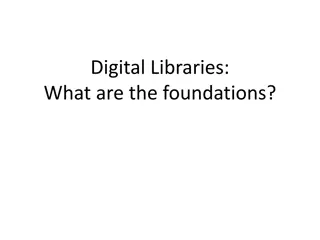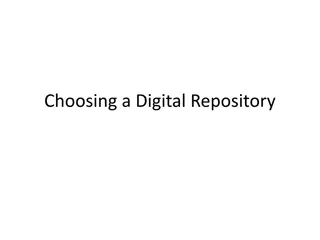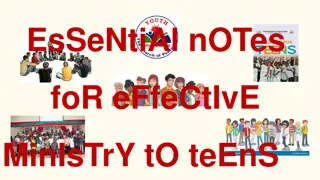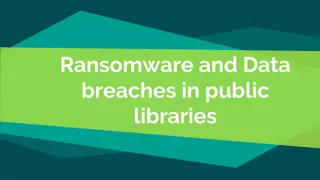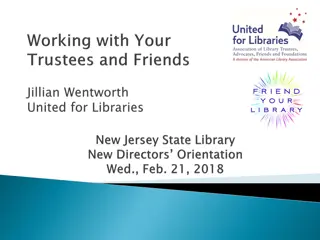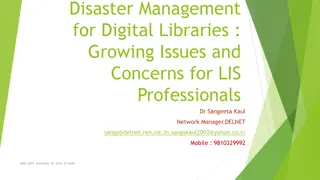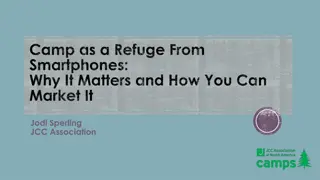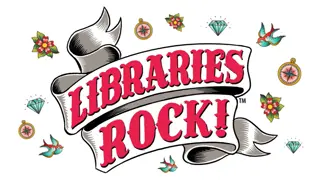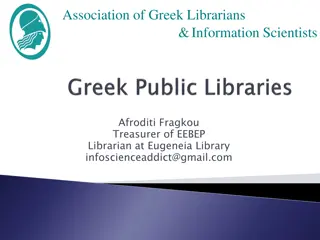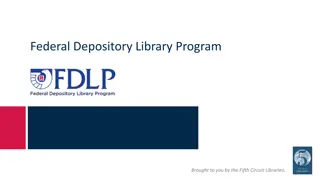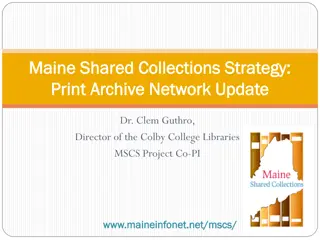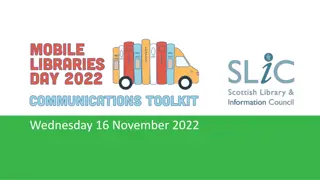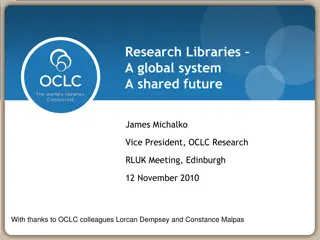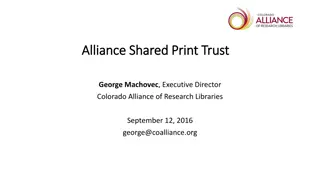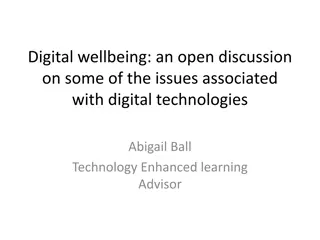Teens and Libraries in Today's Digital World
In today's digital age, teens interact with information and learning in unique ways, impacting their use of libraries. Research shows that teens have varied reading habits, use libraries differently, and prioritize certain services. As super-tech-saturated individuals, they heavily rely on the internet, social networking sites, and mobile devices. Understanding these trends is crucial for libraries to adapt to the evolving needs of teens and align their services accordingly based on feedback from the public and educators.
Download Presentation

Please find below an Image/Link to download the presentation.
The content on the website is provided AS IS for your information and personal use only. It may not be sold, licensed, or shared on other websites without obtaining consent from the author.If you encounter any issues during the download, it is possible that the publisher has removed the file from their server.
You are allowed to download the files provided on this website for personal or commercial use, subject to the condition that they are used lawfully. All files are the property of their respective owners.
The content on the website is provided AS IS for your information and personal use only. It may not be sold, licensed, or shared on other websites without obtaining consent from the author.
E N D
Presentation Transcript
Teens and Libraries in Today s Digital World Lee Rainie Director Pew Internet Project April 9, 2014 Texas Library Association @lrainie | @pewinternet | @pewresearch
C:\Users\lrainie\AppData\Local\Microsoft\Windows\Temporary Internet Files\Content.Outlook\4YD0DD0G\FactTank-logo_300x100.png Tell the truth, and trust the people -- Joseph N. Pew, Jr. http://bit.ly/dUvWe3 http://bit.ly/100qMub pewinternet.org libraries.pewinternet.org
7 takeaways from our research 1) Teens live in a different information ecosystem 2) Teens live in a different learning ecosystem 3) Teens reading efforts match/exceed adult levels 4) Teens use libraries and librarians more than others, but don t necessarily love libraries as much 5) Teens have different priorities in library services 6) Teens will behave differently in the world to come 7) The public and teachers recognize this and want libraries to adjust to it
7 takeaways from our research 1) Teens live in a different information ecosystem 2) Teens live in a different learning ecosystem 3) Teens reading efforts match/exceed adult levels 4) Teens use libraries and librarians more than others, but don t necessarily love libraries as much 5) Teens have different priorities in library services 6) Teens will behave differently in the world to come 7) The public and teachers recognize this and want libraries to adjust to it
The super-tech-saturated teens 95% use internet / ~ three-quarters have broadband at home 74% access internet on mobile device 25% cell mostly internet users 78% have cell phones / 47% have smartphones 80% have desktop/laptop 23% have tablet computers 81% use social networking sites 76% use Facebook - 24% use Twitter Approx. from young adult data: a quarter of teens use Instagram; 1 in 7 use Pinterest; 1 in 10 use Tumblr
Data and info is a third skin
7 takeaways from our research 1) Teens live in a different information ecosystem 2) Teens live in a different learning ecosystem 3) Teens reading efforts match/exceed adult levels 4) Teens use libraries and librarians more than others, but don t necessarily love libraries as much 5) Teens have different priorities in library services 6) Teens will behave differently in the world to come 7) The public and teachers recognize this and want libraries to adjust to it
Online survey of 2,462 teachers with College Board / National Writing Project 77% of teachers surveyed say the internet and digital search tools have had a mostly positive impact on their students research work 87% agree these technologies are creating an easily distracted generation with short attention spans
76% of the teachers in this study strongly agree the internet enables students to access a wider range of resources than would otherwise be available 76% strongly agree that internet search engines have conditioned students to expect to be able to find information quickly and easily
65% agree to some extent that the internet makes today s students more self- sufficient researchers 83% agree that the amount of information available online today is overwhelming to most students
90% agree that the internet encourages learning by connecting students to resources about topics of interest to them 71% agree that today s digital technologies discourage students from using a wide range of sources when conducting research
Grading students research skills Excellent Very good Good Fair Poor 20% Ability to use appropriate and effective search terms and queries 36% 29% 9% 6% 19% Understanding how online search results 29% 26% 21% 5% are generated 12% Ability to use multiple sources to effectively support an argument 26% 39% 20% 3% 11% Ability to assess the quality and accuracy of information they find online 26% 37% 24% 3% 6% Patience and determination in looking for information that is hard to find 15% 35% 43% 1% 7% 20% 38% 33% Ability to recognize bias in online content 1% 0% 50% 100%
Upshot: Learning is a process; more than it is a transaction 2/21/2025
Todays students are really no different from previous generations, they just have different tools through which to express themselves. Agree Disagree 52% 47%
7 takeaways from our research 1) Teens live in a different information ecosystem 2) Teens live in a different learning ecosystem 3) Teens reading efforts match/exceed adult levels 4) Teens use libraries and librarians more than others, but don t necessarily love libraries as much 5) Teens have different priorities in library services 6) Teens will behave differently in the world to come 7) The public and teachers recognize this and want libraries to adjust to it
How many books Americans read Among book readers, the mean and median number of books each group read in the past 12 months, among all Americans ages 16 and older Mean number of books read (average) Median (midpoint) All those 16 and older 17 8 Ages 16-7 18 10 Ages 18-24 17 7 Ages 25-29 17 6 Ages 30-39 14 6 Ages 40-49 15 6 Ages 50-64 18 8 Ages 65+ 23 12
Reading on a typical day (among book readers) 60% 57% 53% 50% 49% 48% 40% 39% 39% 38% 30% 20% 10% 0% 16-17 18-24 25-29 30-39 40-49 50-64 65+
Young readers are instrumental readers Ages 16-29 Ages 30+ 90% 80% 81% 81% 81% 79% 76% 70% 73% 73% 60% 50% 49% 40% 30% 20% 10% 0% Read for work/school Read for pleasure Read to keep up with current events Read to research topics of interest
Young e-book readers read on all kinds of devices 60% Ages 16-29 Ages 30+ 55% 50% 46% 40% 41% 38% 30% 26% 25% 23% 20% 16% 10% 0% Cell phone Desktop or E-reader Tablet laptop
7 takeaways from our research 1) Teens live in a different information ecosystem 2) Teens live in a different learning ecosystem 3) Teens reading efforts match/exceed adult levels 4) Teens use libraries and librarians more than others, but don t necessarily love libraries as much 5) Teens have different priorities in library services 6) Teens will behave differently in the world to come 7) The public and teachers recognize this and want libraries to adjust to it
Used library in past year 80% 70% 72% 60% 59% 58% 57% 56% 54% 50% 49% 40% 30% 20% 10% 0% 16-17 18-24 25-29 30-39 40-49 50-64 65+
Got help from a librarian (among library users) 50% 45% 43% 40% 35% 30% 25% 27% 20% 21% 21% 19% 15% 17% 10% 11% 5% 0% 16-17 18-24 25-29 30-39 40-49 50-64 65+
Closing the library would have a major impact on my community as a whole Ages 16-17 43% Ages 18-24 48% Ages 25-29 58% Ages 30-39 68% Ages 40-49 69% Ages 50-64 67% Ages 65+ 64% 0% 20% 40% 60% 80% 100%
7 takeaways from our research 1) Teens live in a different information ecosystem 2) Teens live in a different learning ecosystem 3) Teens reading efforts match/exceed adult levels 4) Teens use libraries and librarians more than others, but don t necessarily love libraries as much 5) Teens have different priorities in library services 6) Teens will behave differently in the world to come 7) The public and teachers recognize this and want libraries to adjust to it
Teens say they would likely use Teens Non-teens 100% 86% 81% 80% 80% 74% 70% 63% 62% 62% 62% 60% 57% 60% 50% 40% 20% 0% Personal book recommendations Library Redboxes around town Cell app that allows you to use library services Pre-loaded e-book readers App for in-library navigation Classes on gadget use
7 takeaways from our research 1) Teens live in a different information ecosystem 2) Teens live in a different learning ecosystem 3) Teens reading efforts match/exceed adult levels 4) Teens use libraries and librarians more than others, but don t necessarily love libraries as much 5) Teens have different priorities in library services 6) Teens will behave differently in the world to come 7) The public and teachers recognize this and want libraries to adjust to it
How will hyperconnected Millennials live? http://pewinternet.org/Reports/2012/Hyperconnecte d-lives.aspx
Millennials future In 2020 the brains of multitasking teens and young adults are "wired" differently from those over age 35 and overall it yields helpful results. They do not suffer notable cognitive shortcomings as they multitask and cycle quickly through personal- and work-related tasks. Rather, they are learning more and they are more adept at finding answers to deep questions, in part because they can search effectively and access collective intelligence via the Internet. In sum, the changes in learning behavior and cognition among the young generally produce positive outcomes.
Millennials future In 2020, the brains of multitasking teens and young adults are "wired" differently from those over age 35 and overall it yields baleful results. They do not retain information; they spend most of their energy sharing short social messages, being entertained, and being distracted away from deep engagement with people and knowledge. They lack deep-thinking capabilities; they lack face-to- face social skills; they depend in unhealthy ways on the Internet and mobile devices to function. In sum, the changes in behavior and cognition among the young are generally negative outcomes.
Millennials future Change for the better 52% Change for the worse 42%
7 takeaways from our research 1) Teens live in a different information ecosystem 2) Teens live in a different learning ecosystem 3) Teens reading levels match/exceed adult levels 4) Teens use libraries and librarians more than others, but don t necessarily love libraries as much 5) Teens have different priorities in library services 6) Teens will behave differently in the world to come 7) The public and teachers recognize this and want libraries to adjust to it
Teachers press for literacy 57% spend class time helping students improve their search skills 35% devote class time to helping students understand how search engines work and how search results are generated Asked what curriculum changes might be necessary in middle and high schools today, 47% strongly agree and 44% somewhat agree that courses or content focusing on digital literacy must be incorporated into every school s curriculum.
Coordinate more closely with local schools in providing resources to kids 77% 19% 3% Offer free early literacy programs to help young children prepare for school 77% 17% 3% Should definitely do Maybe do Definitely NOT do
Be not afraid
Libraries.pewinternet.org Lee Rainie Email: lrainie@pewinternet.org Twitter: @Lrainie Kathryn Zickuhr Email: kzickuhr@pewinternet.org Twitter: @kzickuhr Kristen Purcell Email: @kpurcell@pewinternet.org Twitter: @kristenpurcell
